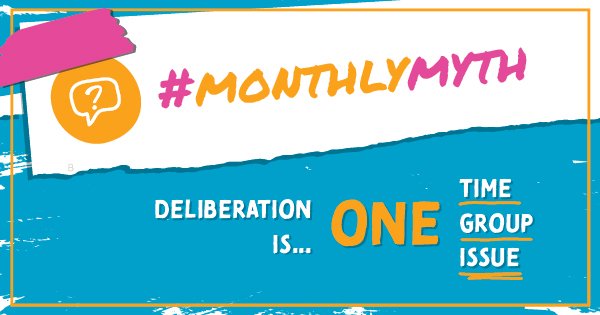Are you strategising secretly? A lot of strategic planning gets done in the dark, which causes plenty of prickly problems. One of the biggest issues with this approach is you get a final plan that doesn’t tackle what’s hard, lacks support and possibly ends up sitting on the shelf. We’re here to help you get your next planning process out into the light. There’s lots of ways to get there, and it doesn’t have to be hard. We’ve got tips to help you develop a plan that has more meaning and impact - something everyone can stand behind.
#MONTHLYMYTH: NO CONSEQUENCES FOR CUTTING ASSET PLAN CORNERS
Victorian councils - don't delay your Asset Plan engagement! Thinking you might rush it through after council elections? If so, it could be time to reconsider. Want to meet Local Government Act requirements, build a plan your decision-makers can stand behind and avoid risks? Then it's almost time to start planning your engagement process. This monthly myth explores the risks of cutting corners, ways to make the most of this golden opportunity, a solution for working around council elections and how to determine the right scale for your deliberative engagement process.
#MONTHLYMYTH: TIGHT TIMELINES? RUSH IT THROUGH
#MONTHLYMYTH: DELIBERATION IS ONE TIME, ONE GROUP, ONE ISSUE
We’re seeing plenty of examples of deliberative engagement that involve one randomly selected group working on one issue over a few days together. That approach can be super effective and powerful when done right. There are lots of other exciting possibilities to explore though. Perhaps, an alternative model might be a better fit for your organisation and community or a more effective way to tackle the problem you’re trying to solve.
#MONTHLYMYTH: ENGAGEMENT AND DELIBERATION ARE SIMILAR TO MARKET RESEARCH
We’re sometimes asked if we provide market research services, or if deliberation is a bit like market research. While both areas involve people and information, they involve them in very different ways. The two concepts differ in terms of intent, design and process. This myth post drills down into the key differences between the two, how they might sometimes intersect and why they’re separate, specialised fields.
#MONTHLYMYTH: BELIEFS ARE UNCHANGEABLE
#MONTHLYMYTH: DELIBERATION IS FOR THE COUNCILLORS NOT FOR THE PEOPLE!
We often hear councillors and staff saying they don’t need to involve the community in deliberation as it is the role of councillors, or any elected official, to deliberate on an issue and make decisions. It is important to note that deliberative engagement does not supersede or dismiss the role of councillors in making decisions.
In this #MonthlyMyth, we discuss the five main ways that deliberation can help decision-makers and add value, rather than take away their decision-making powers.
#MONTHLYMYTH: CALL IT DELIBERATION & IT WILL BE
Deliberative democracy isn’t a ‘one size fits all’ type of deal. Deliberative processes can come in multiple packages, and deliberative elements can be integrated into a range of different engagement approaches. However, a truly deliberative process is built around some simple core principles, and it’s risky to call a process ‘deliberation’ if it doesn’t truly hit the mark.
So, what are the principles of deliberative democracy, and how would we know if a process wasn’t truly deliberative?
#MONTHLYMYTH: FACILITATORS NEED TO BE CONTENT EXPERTS
Facilitators work across many industries, audiences and topics, and sometimes the issues or information being considered are complex or technical. We’re often asked how we manage to move across so many broad ranging issues and projects, and whether we need to become ‘experts’ in each topic before we facilitate.
This #MonthlyMyth explores some of the misunderstandings that sit behind this myth, highlights the true role of a facilitator, and uncovers how facilitators really work with information and content.
#MONTHLYMYTH: DELIBERATION IS ALWAYS THE ANSWER
Deliberation can be refer to either a micro-process (something you can build into part of a session or engagement process) or a full deliberative democracy process (such as a citizens’ jury).
Deliberative engagement has a lot of potential benefits - these processes can lead to new solutions to challenging problems, improve policy outcomes and engender trust between citizens and decision makers.
So, is deliberation always the right answer/process? The short answer is no.














